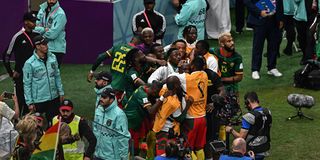World Cup offers window to review our sports policies

Cameroon's forward #10 Vincent Aboubakar celebrates scoring his team's first goal with teammates during their Qatar 2022 World Cup Group G match against Brazil at the Lusail Stadium in Lusail, north of Doha on December 2, 2022.
This year’s FIFA World Cup comes at a time in Kenya when national football management is under deep scrutiny. The Football Kenya Federation (FKF), the national governing body of football, was banned from FIFA in February for reasons including misappropriated funds and was reinstated just a few days ago after promises for reform and the re-appointment of the FKF executive committee. It is hoped that this will progress well.
A key issue with situations like these is the high opportunity cost to the people who have made many sacrifices to be able to represent their national team. The athletes, coaches and others want to hope that their league and national teamwork will be successful, and many have turned down lucrative opportunities elsewhere to support their countries. Athletic careers also have a stopwatch on them, as age is linked to performance capability, so nine months of time on ice is very costly.
A similar situation is under investigation on the side of the national Kenya sevens rugby team. Management issues limited resource flows to them. As such, unpaid team members unable to meet obligations were still expected to train and prepare for pending international competitions.
Further, Kenyan runners have been denied kits or forced to take late flights to tournaments while being expected to perform as if they had full support and care. Beyond this, several athletes have reported waiting for years to be paid promised prize money by the government.
Women’s teams
Kenyan athletes should never have to bear cruel and humiliating mismanagement, mainly because their hard work raises the nation’s profile in huge and impactful ways. Further, if this is how the men’s premier teams in sports with massive followings are being treated in public, how are smaller teams, or even women’s teams, in smaller sports, faring?
The World Cup context is thus a great opportunity for Kenya to take multiple cues from other teams about how to respect and work well with athletes, their technical and strategic support, and how to resource and manage them appropriately.
Nonstop calls for blanket charitable private-sector support should stop. Sports have evolved globally, and sophisticated investment models leverage the star power of individual athletes for merchandise sales, commercial sponsorships and public events, as well as resourcing talent development and scouting to build loyal audiences.
The long-promised improvement to current stadia, and the erection of new ones, can herald team and infrastructure development in ways that create better resource flows for all.
The government should exit the role of gatekeeper and become a strategic enabler, catalysing progress in Kenyan football, rugby and all sports, in ways that benefit not just premier teams and prime athletes, but also emerging talent, and the supportive structures and personnel who together build a thriving sports sector in the nation.
Ms Okore is a Policy Analyst; [email protected]





